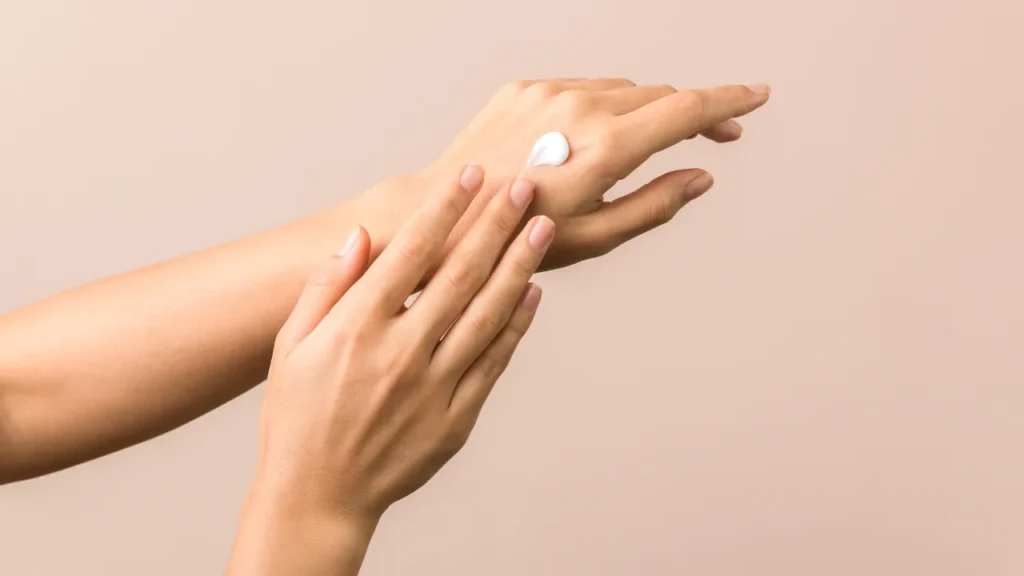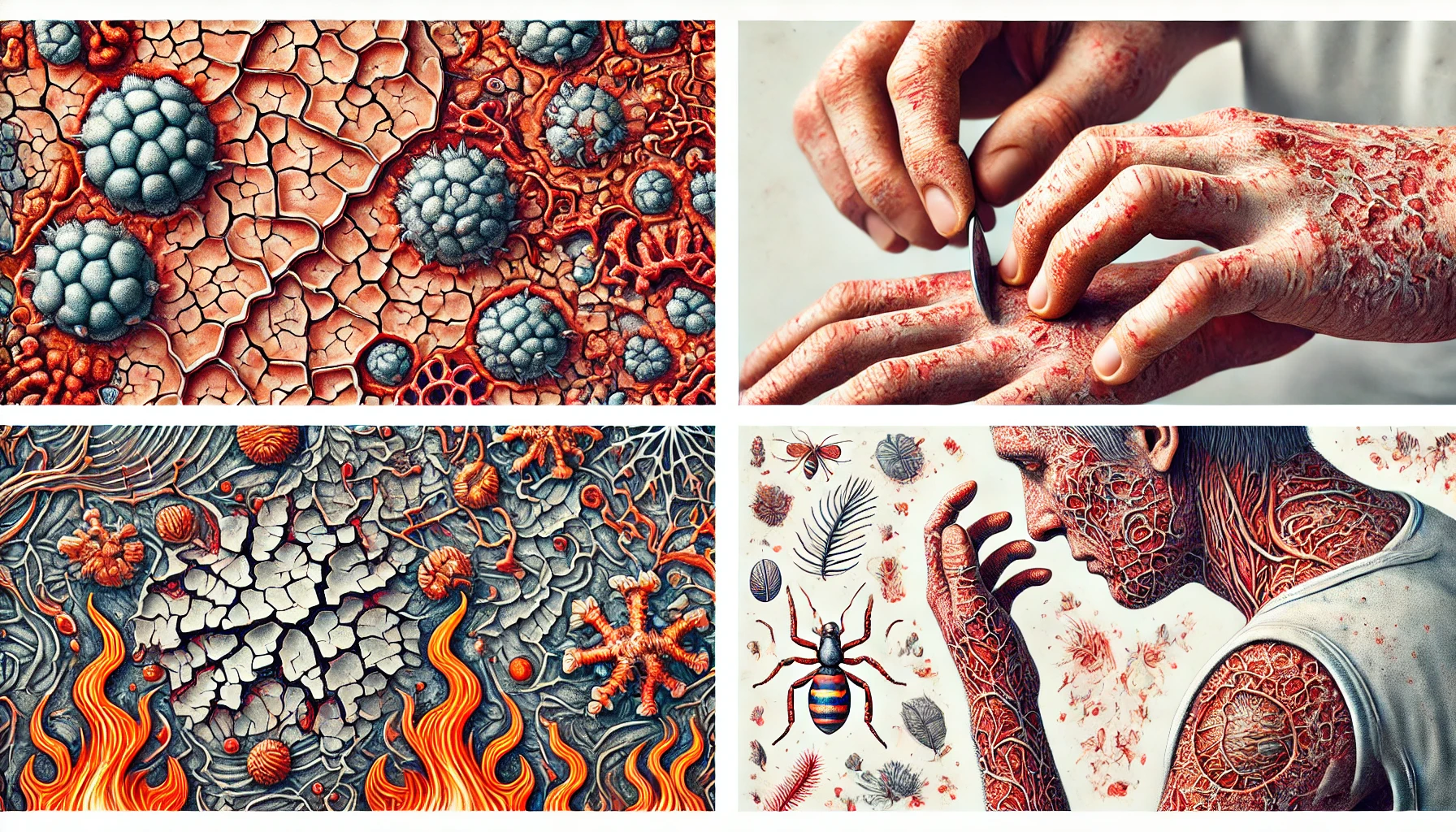Description
Eczema, also known as atopic dermatitis, represents a persistent skin condition that may be very upsetting for people of all ages. Eczema, which is marked by dry, itchy, and irritated skin, has an enormous impact on a person’s quality of life. It is a complex condition affected by immunological, environmental, and hereditary elements. Eczema frequently appears in children and can last into adulthood. Although it can impact any portion of the body, the neck, face, arms, and area behind the knees are frequently affected. Although the precise cause of eczema is still unknown, many things are thought to play a role in its emergence.
You May Also Like:
Chronic autoimmune urticaria: Description, Causes, and Treatment Protocol
IgA nephropathy / Berger’s disease: Description, Causes, and Treatment Protocol
Eczema/Atopic Dermatitis: Description, Causes, and Treatment Protocol is an original (MedNewsPedia) article.
Possible Causes
The skin disorder eczema, also known as atopic dermatitis, has a number of possible reasons and contributing factors. The following are some of the potential causes of eczema: –
Immune System Dysregulation: An excessive immune response is a feature of eczema. Allergens and irritants cause the immune system to overreact, resulting in skin irritation and itching.
Genetics: Genetic predisposition constitutes a big contributor to eczema. People who have a history of allergies, atopic dermatitis, or allergic disorders are more susceptible. Particular genes involved include those that affect immune response and skin barrier function.
Skin Barrier Dysfunction: Several eczema patients have reduced skin barrier function, which allows moisture loss and leaves the skin susceptible to allergens and irritants.
Environmental Factors: Environmental allergens (including pollen, dust mites, and pet dander), irritants (like harsh soaps and detergents), and adverse weather conditions may all trigger or exacerbate eczema symptoms.
Microbial Infections: When the skin’s surface is broken by scratching and allows hazardous microbes to enter viral, bacterial, or fungal infections may worsen eczema.
Hormonal Changes: Hormonal changes might affect the severity of symptoms, particularly in women during menstruation or pregnancy.
Stress: Since stress hormones can aggravate inflammation, emotional tension, and anxiety can cause or intensify eczema flare-ups.
Allergies: Allergies and eczema frequently coexist. Eczema symptoms may worsen in response to allergic reactions to particular things, including clothing, cosmetics, or metals (like nickel).
Dietary Factors: Despite not being the direct cause of eczema, certain people’s dietary habits may cause or exacerbate it. Dairy, eggs, nuts, seafood, and nuts are typical dietary triggers.

Exacerbating and Mitigating Factors
Different factors may have an impact on the severity and recurrence of eczema symptoms, which may differ from individual to individual. Effective eczema management requires an understanding of these exacerbating (aggravating) and mitigating (alleviating) factors. The main causes and effects of eczema symptoms are as follows: –
The exacerbating factors are as follows: –
Irritants: Eczema can get worse when the skin’s natural oils are stripped away by harsh chemicals in detergents, soaps, and cleaning supplies. These items’ fragrances have a tendency to irritate people easily, so choosing moderate, hypoallergenic alternatives is crucial.
Allergens: The known causes of eczema include allergens like dust mites, pollen, pet dander, and specific foods. People sensitive to certain allergens frequently develop outbreaks when exposed, aggravating their symptoms.
Stress: Eczema can suffer greatly from psychological stress. Stress hormones can cause inflammatory reactions, which intensify itching and redness.
Scratching: Eczema-related severe itching might cause repetitive scratching. While scratching may offer comfort, it weakens the skin’s protective layer, leaving it more susceptible to infections and irritants, which induces the eczema cycle.
Infections: Skin that is prone to eczema is more vulnerable to viral, bacterial, and fungal diseases. Scratching can spread dangerous bacteria into the damaged skin, causing excruciating flare-ups.
Climate: Extreme weather, particularly dry or humid conditions, may dehydrate the skin, increasing the risk of eczema episodes. Climate-appropriate skincare is essential because severe winters and humid, hot summers can make symptoms worse.
Coconut Oil deeply moisturizes and protects sensitive skin—Heal Naturally, Buy Coconut Oil Today!

The mitigating factors are as follows: –
Avoidance of Triggers: The key is to recognize and avoid triggers. Allergen testing may assist in identifying specific offenders, allowing people to adjust their surroundings and way of life accordingly.
Stress Management: Eczema symptoms can be considerably reduced by using stress-relieving routines like deep breathing, meditation, or hobbies. Utilizing relaxation techniques can lower inflammation by modulating the body’s response to stress.
Moisturization: The key to managing eczema is proper moisturization. Emollients and moisturizers absorb moisture, protecting the skin from dehydration and causing itching.
Gentle Skincare: It is important to use gentle, scent-free products. Hypoallergenic toiletries and non-soap cleansers reduce skin irritability, promoting an improved skin barrier.
Proper Clothing: The skin can breathe when wearing loose-fitting, breathable clothing made of natural fibers such as cotton, which minimizes friction and irritability.
Hydration: Internal and external hydration promotes total skin health. Water consumption supports healing and maintains skin suppleness.
Prescribed Medications: It is crucial to adhere to the dermatologist’s recommended course of treatment, which may include calcineurin inhibitors, topical corticosteroids, or immunosuppressants. Repeated usage can successfully control inflammation and lessen discomfort.
Regular Follow-ups: The management of eczema requires regular discussion with medical professionals. Regular check-ups allow medical personnel to monitor the condition’s development and, if necessary, modify treatment approaches.
Climate Control: Skin dehydration can be avoided by keeping an indoor environment with a consistent temperature and humidity level. It depends on the climate whether humidifiers or dehumidifiers are useful.

Standard Treatment Protocol
In order to manage symptoms, reduce inflammation, and avoid flare-ups, eczema therapy needs a diverse strategy. Usually, the following aspects make up the conventional therapy protocol: –
Topical Corticosteroids: A healthcare professional has prescribed these anti-inflammatory lotions or ointments. During flare-ups, they work well to lessen redness, itching, and inflammation. To prevent side effects including skin thinning, a healthcare practitioner should decide on the dosage and time frame for use.
Topical Calcineurin Inhibitors: The face and neck can be treated with non-steroidal drugs like pimecrolimus (Elidel) and tacrolimus (Protopic). They aid in reducing itchiness and inflammation.
Emollients and Moisturizers: Managing eczema requires maintaining moisturized skin. Moisturizers and emollients aid in repairing the skin barrier and retaining moisture. To prevent irritation, people should apply hypoallergenic and fragrance-free products.
Antihistamines: Antihistamines can help alleviate itching, particularly at night when conditions are likely to worsen. Antihistamines without sedation are frequently favored during the day.
Phototherapy (Light Therapy): Phototherapy includes exposing one’s skin to particular UV light wavelengths while being supervised by a dermatologist. It may work for people with severe or persistent eczema.
Wet Wrap Therapy: Wet wrap therapy may be helpful for people with severe eczema. In order to increase hydration and decrease itching, moisturizing the afflicted regions and wrapping them in damp bandages is required.

Treatment Options
People with eczema have access to a number of treatment choices and adjunct therapies in addition to conventional treatment methods. Complementing traditional therapies with these choices can assist in effectively controlling symptoms. Following are some examples of eczema treatments and complementary therapies: –
Prescription Medications: These are as follows: –
Dupilumab (Dupixent)
This biologic drug reduces the symptoms of eczema by specifically targeting an immunological pathway that is involved in the condition.
Immunosuppressants
When various therapies have failed to control serious cases of eczema, doctors may prescribe drugs such as cyclosporine or methotrexate.
Over-the-Counter Formulations: They consist of the following: –
Hydrocortisone Creams
The symptoms of mild eczema may be temporarily relieved by using modest hydrocortisone creams.
Barrier Creams
These items aid in defending the skin’s natural barrier and preventing moisture loss.
Nutritional Supplements: These are listed below: –
Magnesium
Magnesium supplements might reduce the pain and cramping that come with endometriosis. Magnesium is well known for calming muscles and reducing menstrual cramps.
Omega-3 Fatty Acids
Omega-3 supplements, frequently made from fish oil, may aid in reducing inflammation and enhancing skin barrier performance.
Probiotics
Probiotic supplements may, according to some research, help regulate the body’s immune response and alleviate eczema symptoms, particularly in children.
Herbal and Natural Remedies: These include the following: –
Evening Primrose Oil
Gamma-linolenic acid, a component of this herbal supplement, can minimize inflammation and enhance skin moisture.
Calendula
Creams or ointments containing calendula possess anti-inflammatory qualities and help calm sensitive skin.
Coconut Oil
Coconut oil can add moisture and alleviate dryness by being applied to troubled regions.
Soothe dryness and reduce eczema flare-ups with Coconut Oil—Nourish Your Skin, Shop Coconut Oil Now!

Adjunct Therapies: These are as follows: –
Acupuncture
Despite the paucity of scientific data, several people claim that acupuncture helps them with their symptoms.
Allergen Immunotherapy
Allergen immunotherapy (sublingual drops or allergy shots) might be an option for patients whose eczema is brought on by particular allergens.
Hypnotherapy and Stress Reduction
Stress management is essential since stress can cause or worsen eczema symptoms. Yoga, hypnosis, and other forms of relaxation can be beneficial.
However, the efficacy of adjunct therapy can differ from person to person, it is vital to remember that. Additionally, patients should speak with a dermatologist or healthcare professional before beginning any new therapy, including natural cures or supplements, particularly if they have any underlying medical conditions or are using other drugs. The greatest solution for treating eczema and enhancing a person’s quality of life is a customized treatment strategy that combines conventional medical procedures with auxiliary therapies designed to meet their unique needs.
Conclusion
Eczema, or atopic dermatitis, is a chronic and complex condition that requires a multifaceted approach to management. From traditional treatments like topical corticosteroids and antihistamines to complementary therapies such as dietary modifications, probiotics, and stress reduction, an individualized treatment plan is key to symptom relief and improved quality of life. Identifying triggers, maintaining proper skin care, and adhering to prescribed medical protocols are essential in preventing flare-ups and promoting skin barrier health.
By combining medical interventions with lifestyle changes and adjunct therapies tailored to the individual’s needs, eczema sufferers can achieve better symptom control and a higher standard of living. Consulting with healthcare professionals ensures that treatment plans are safe, effective, and aligned with the unique needs of each patient, paving the way for long-term management and relief.

Additional resources for further reference
https://www.healthdirect.gov.au/eczema
https://www.aafp.org/pubs/afp/issues/2012/0701/p35.html
https://onlinelibrary.wiley.com/doi/full/10.1111/j.1468-3083.2012.04636.x
https://onlinelibrary.wiley.com/doi/abs/10.1111/dth.13121
Important Note: The information contained in this article is for general informational purposes only, and should not be construed as health or medical advice, nor is it intended to diagnose, prevent, treat, or cure any disease or health condition. Before embarking on any diet, fitness regimen, or program of nutritional supplementation, it is advisable to consult your healthcare professional in order to determine its safety and probable efficacy in terms of your individual state of health.
Regarding Nutritional Supplements Or Other Non-Prescription Health Products: If any nutritional supplements or other non-prescription health products are mentioned in the foregoing article, any claims or statements made about them have not been evaluated by the U.S. Food and Drug Administration, and such nutritional supplements or other health products are not intended to diagnose, treat, cure, or prevent any disease.


